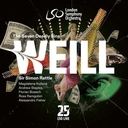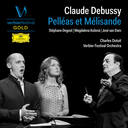So that’s what an evening in the Rattles’ Berlin drawing room is like. Sir Simon, casually elegant, sits at the piano. Local friends and others drop in, with instruments. The hostess Magdalena Kozená enters with a bouquet of song in four different languages. And an evening of wonderful music-making begins. The only ingredients possibly missing from this Wigmore Hall concert were a commodious tray of Czech pastries and Rattle’s choicest red wines.
Kozená was on the top of her best form, wielding her ochre-tinted mezzo without choking mannerisms or strain, gliding effortlessly between French, German, English and Czech in piquant songs by Dvorák, Chausson, Stravinsky, Strauss, Ravel, Janácek: definitely a connoisseur’s choice. All this plus the novelty of her husband at the piano.
At times Rattle plied the keys with a force that indicated he could usefully read Gerald Moore’s memoir Am I too Loud?, but on the whole he behaved impeccably. And he certainly surrounded himself with the instrumental cream, from Andrew Marriner’s squawking clarinet to the golden violin and viola of Daishin Kashimoto and Amihai Grosz, two of the Berlin Philharmonic’s leading lights.
Whatever her repertoire or vocal register, Kozená hit the spot: hugging the desolate gloom of Chausson’s Chanson perpétuelle; spiking each angular phrase in Stravinsky’s Three Songs from William Shakespeare; languid, then fierce, in Ravel’s Chanson madécasses; or following the Shakespeare line in very contrasting Ophelia songs by Strauss (dramatic) and Brahms (touchingly euphonious).
Most enjoyable of all were her visits back home, to the Czech nursery rhymes of Janácek’s Rikadla (complete with ad hoc chorus) and a sextet of Dvorák favourites dressed up for the night in sympathetic new orchestrations by Duncan Ward. Total bliss, domestic and musical. I couldn’t be a permanent house guest, could I?
© Geoff Brown



